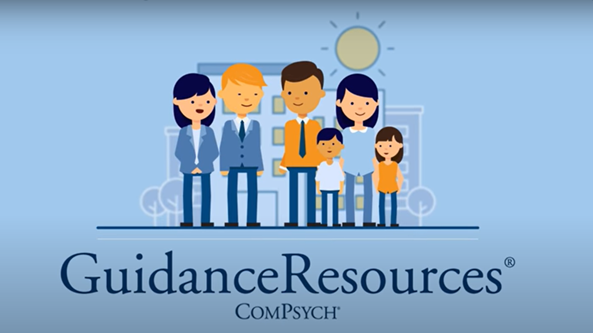
The Employee Assistance Program (EAP) helps you privately solve problems that may interfere with your work, family, and life in general. EAP services are FREE to you, your dependents, and all household members. EAP services are confidential and provided by experts.
GuidanceResources provides EAP services 24/7 to all employees, State Plan members, their dependents and household members.
 |
|
|
Note: You must contact GuidanceResources for approval before scheduling an appointment with a counselor to ensure your first six visits are covered under the EAP benefit. Dependent or household member will need to provide the first and last name of the employee/State Plan member who provided you with the GuidanceResources contact information. The online chat function is available Monday- Friday 7:00am – 5:00pm MST. |
|
Employee Assistance Program Services
Sometimes life can feel overwhelming. It doesn’t have to. GuidanceResources provides confidential counseling, expert guidance and valuable resources to help you handle any of life’s challenges, big or small. Learn how the Employee Assistance Program can support you and your household by reviewing this informative flyer.
-
Anxiety, depression, stress
-
Grief, loss and life adjustments
-
Relationship/marital conflicts
-
Finding child and elder care
-
Hiring movers or home repair contractors
-
Planning events, locating pet care
-
Retirement planning, taxes
-
Relocation, mortgages, insurance
-
Identity theft support
-
Budgeting, debt, bankruptcy and more
-
Divorce, adoption and family law
-
Real estate, foreclosure, landlord/tenant issues
-
Free consultation and discounted local representation
-
Quickly and easily complete a will on your computer with EstateGuidance
-
Specify guardians, trustees and property division
-
Provide funeral and burial instructions
-
Self-care platform offers guided health programs
-
Tackle anxiety, depression, stress
-
Improve mindfulness, sleep, and more
-
Online Tips and Tricks: Once you are have registered and signed into your account, there are several ways to get connected with services. The chat function is available Monday- Friday 7:00 – 5:00 MST and is a great way to request an answer.

Free Webinars and Training
Watch this GuidanceResouces Orientation on-demand presentation about EAP services.
Scheduled Trainings - All Session Times are 12:00-1:00 p.m. MST
- February 3: . . YOU: Boosting Self-Esteem and Acceptance
- February 10: Emotional Intelligence
- February 11: Feeling Stuck? Practical Ways to Get Yourself Going Again
- February 17: Mindfulness: Being Present in Your Work and Life
- February 24: Developing a Growth Mindset
- February 25: Avoiding Burnout: Self-Assessment
Huddles
On Demand Training Opportunities
Training sessions are available on-demand, simply click the link below to start learning.
-
Mental Health Safety Plan: Safety Plan & Instructions
-
Suicide Awareness Presentation (contact eap@mt.gov for closed captioning or alternate formats)
Managers' Corner
The EAP provides no-cost specialized resources and trainings to help supervisors support their employees.
Management-Focused Training Courses - All Session Times are 12:00-1:00 p.m. MST
- LinkedIn Training: Prevent Team Burnout as a Manager
- February 4: Self-Care Tips for Managers
- February 18: Psychological Pressures of Middle Management
On-Demand Trainings
-
Brining Out the Best in Others - on-demand presentation
-
For Managers: Your Employee Assistance Program - services overview flyer
-
Critical Incident Support – request for an on-site counselor for your team
-
Leading with Authenticity - on-demand presentation
-
Manager Orientation - on-demand presentation
-
Managing Remote (or hybrid) Employees - on-demand presentation
-
Managing Staff Through Stressful Situations - on-demand presentation
- Psychological Safety in the Workplace - on-demand presentation
-
GuidanceResouces Training Catalog - Choose from a list of workshops to provide behavioral health or professional training to your group. All trainings must be coordinated through the EAP Program Manager, Ann Brewer, at eap@mt.gov.
Manager Support
Self-Care and Why It's Important
What is self-care and why are we starting to hear more and more about it?
To clear up a common misconception, self-care is not splurging on lavish items or sneaking off to the spa for the day. Self-care is not being “selfish;” it’s finding ways to take care of yourself and to ensure:
- you are strong and healthy enough to care for others when needed;
- you can show up to your job in the best physical and mental state; and
- you’re able to accomplish all that you need to in a day.
The World Health Organization defines self-care as “the ability of individuals, families, and communities to promote health, prevent disease, maintain health, and cope with illness and disability with or without the support of a health care worker.” Taking care of your emotional health needs are as equally important as taking care of your nutrition, physical hygiene, and seeking medical care when needed.
Still unsure of the benefits of self-care and how it can help you? From a national survey conducted by MentalHealthFirstAid.org, the benefits speak for themselves. Here are some statistics to support just how important this mindset is to your mental/physical health:
- Enhanced self-confidence (64%)
- Increased productivity (67%)
- Happiness (71%)
- Physical health from self-care has been shown to reduce heart disease, stroke, and cancer.
- Mental health benefits – clinically proven to reduce or eliminate anxiety and depression, reduce stress, help adapt to change, build strong relationships, and better recover from setbacks.
“Where do I start?” you ask? Setting goals for yourself is a great way to determine which self-care action provides you with the best results. Below are just a few goal ideas to get you started:
- Take care of your physical and psychological health.
- Manager and reduce stress.
- Recognize your emotional needs.
- Foster and sustain relationships.
- Achieve balance in different areas of your life.
Below are free resources for extra support and connection:
- Build Your Self-Care Plan (Right Direction)
- Free Online Depression Test (Mental Health America)
- Mindfulness and Relaxation Toolkit
- Mental Health 101 (Mental Health America)
- What to Expect When You Start Counseling
- 12 Ways to Take Better Care of Yourself (Psychology Today)
- February Huddle Schedule
- Tax Help




